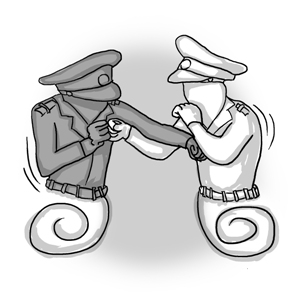METRO SHANGHAI / METRO SHANGHAI
Con men exploit public deference to authority

Illustration: Lu Ting/GT
This week I talked with my foreign friends about a number of news stories in Shanghai: white-collar workers hiring ghost writers to produce annual reports; unsatisfactory year-end bonuses driving employees to hop jobs; a court case of an Australian man attempting to smuggle $100,000 worth of gold out of Pudong airport; and a 15-year-old middle school student who gave birth to a baby boy in the middle of an exam on Tuesday. But another news item intrigued them more, sparking curiosity in the Chinese public's deference to uniforms.
According to Qingpu district police, three men have been arrested for posing as fire inspectors to trick local factories into buying fire prevention equipment. The suspects bought military uniforms online and dressed as a captain or sergeant when they visited the factories. The local fire brigade is under joint supervision of the army and public security bureau.
Only when a squad of police officers came across the men did their scam begin to emerge. Before that, they succeeded in cheating 5,000 yuan ($826) from several factory owners. It seems that business would have gone smoothly had it not been for the chance encounter with real police officials. Why were they not questioned? I assume their uniforms played an important role.
A uniform is a symbol of authority. Historically speaking, only civil servants and people working in State-owned companies wore uniforms. Those people are to some extent, considered superior to others as they hold a lifelong "rice bowl," a steady job which even now is still favored by quite a large number of Chinese people.
Working in the name of the State, and with the title of a public servant, people with uniforms are traditionally respected and usually others won't or dare not challenge them. This may well illustrate why many crimes are committed in uniform.
As the name indicates, a public servant is meant to serve the public in the name of the country. And for the employees of a big company, the uniform means that they are representing the company itself, which usually has a good reputation and is considered trustworthy. Unfortunately, many people's natural trust of those in uniform has been exploited to cheat them of money and property.
There have been countless news stories of criminals in uniform posing as workers from gas, water and electricity companies. They knock on doors in residential compounds, showing their fake ID and pretending to check the pipelines and meters inside. After a show of inspecting the property, they tell you they've found potential hazards in your home, but luckily, they have just the gadget to sell you that will avert a crisis.
They always choose weekdays when only retired old people are at home alone. Media reports show that the majority of victims of these scams are the elderly. They are often less vigilant because of their relative isolation and their tendency to trust uniforms more blindly than younger generations.
Although frequent warnings are issued in residential compounds, we are still sorry to hear of economic losses suffered by so many local residents.
Even over the phone, victims of scams have deferred to the invisible uniforms of con men posing as public servants.
The public has long complained about the telephone scams in which a voice message claiming to be from the national public security bureau or a similar organization notifies the receiver that their bank accounts have been involved in an international money laundering business. To avoid further economic loss, targets are encouraged to press a number on the phone to seek help from police. If you are trapped, they will guide you from one invisible uniform to another to convince that you are well served and protected by public servants.
Millions of yuan can be transferred to other accounts within seconds online. Police officials admit that the possibilities to recover the money are very slim as the criminals use a complicated system to transfer funds, often with the help of overseas accomplices. Even in cases where suspects are caught, the money is sometimes gone forever.
In a recent case, a Shanghai woman reported to police that on October 28 she had been duped into transferring 20 million yuan into a bank account controlled by a gang of con artists. In mid-December, local police and overseas counterparts arrested 21 suspects masterminding the telephone scam in Cambodia. But police were still working on locating the 20 million yuan.
On the other hand, we also have to point out that the public's respect for uniforms and authority is also the reason why it's easy for civil servants to take advantage of their identity and take bribes or otherwise profit from individuals or companies under their jurisdiction. Those public servants delude themselves into believing they possess special rights and forget that their duty is to serve the public.
But criminal civil servants are at least easier to trace compared to con artists. A transparent process for public applications is essential to prevent corruption. There should also be a supervising hotline and disciplinary means if a civil servant fails to fulfill his or her public duty.
The author is the managing editor of Global Times Metro Shanghai. fengyu@globaltimes.com.cn

